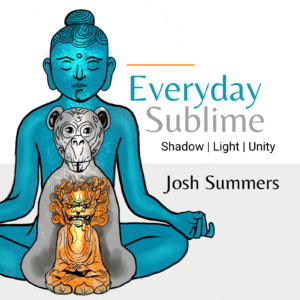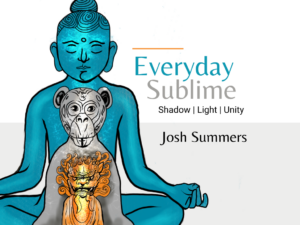In this talk, I discuss practice as a form of improvisation and suggest ways of working with “forms” of practice as a way of developing one’s skills at improvisation. I […]
Dharma Talks
Clinging in Myanmar | Dharma Story
In this talk, I reflect how, on a vipassana meditation retreat in Myanmar, I became compulsively obsessed with finding the perfect height for my meditation cushion; I explore what this […]
An Empty Cup | Dharma Talk with Josh
Like this cup, you are full of your own opinions and speculations. How can I show you Zen unless you first empty your cup? – Zen Master Nan-in
Compassionate Alignment | Dharma Talk with Josh
Real compassion includes wisdom and so it makes judgments of care and concern: it says some things are good, and some things are bad, and I will choose to act only on those things that are informed by wisdom and care. – Ken Wilber
Digging Deep | Dharma Talk
When you dig the well deep enough, you realize we’re all drinking from the same source. – Abdullah Ibrahim
Gratitude For Good Karma: Dharma Talk
A person of integrity is grateful and thankful. This gratitude, this thankfulness is advocated by civil people. – Buddha, Katannu Sutta
From Patience to Peace: Dharma Talk
If you sit and patiently endure, you find your mind going into a state of calm. That calm occurs because there’s no more trying to become something or trying to get rid of something. – Ajahn Sumedho
Peace Within Uncertainty (Part 1): Dharma Talk
Recognition of the Yin Will allows for the creation of the virtue of Wisdom. This Wisdom is not about knowing things. In fact, it is more about being deeply connected to the Unknown… Wisdom is a recognition of a deep knowing that infuses life. – Ted Kaptchuk
Vipassana on the Path: Dharma Talk
Within the process of Vipassana meditation, the meditator develops and rests within a capacity to remain calm and clear towards the entire display of visceral, cerebral and environmental content. – Josh Summers
Basic Vipassana Instructions (Part 2): Dharma Talk
Just as sounds arise and cease naturally within the field of awareness, when attending to their body, the meditator begins to perceive the same impersonal display of sensations arising and ceasing within the stillness of the mind. – Josh Summers
Basic Vipassana Instructions (Part 1): Dharma Talk
When we shift into a vipassana lens of practice, there are no distractions. Each experience the meditator encounters becomes the practice, itself – an experience to see clearly and relate to with compassion. – Josh Summers
The Key To Stillness (Part 1): Dharma Talk
“This mind of ours is already unmoving and peaceful. Our practice is simply to see the Original Mind.” – Ajahn Chah
A Still Forest Pool: Dharma Talk
“Try to be mindful, and let things take their natural course. Then your mind will become still in any surroundings, like a clear forest pool. All kinds of wonderful, rare animals will come to drink at the pool, and you will clearly see the nature of all things.” – Ajahn Chah
Metta, Vipassana, and Creativity: Dharma Talk
Just as a musician learns musical etudes to develop and refine their capacities for musical expression, a contemplative can learn meditative etudes – exercises that nurture the capacities of the Heart/Mind.
Linda Modaro: The Dharma of Experience
“We aren’t looking to get away from our personal lives [in this approach]… but we’re given permission to bring what’s alive in our lives into our meditation practice.” – Linda Modaro
The Subjectivity of Conventional and Absolute Reality: Dharma Talk
“It would be well if you directed your mind to the deathless element.” – Venerable Sariputta, senior disciple of the Buddha
On Transcending Tribalism: Dharma Talk
“The political problems that impede the evolution of international governance are rooted in human psychology – mainly in what is sometimes called “the psychology of tribalism.” This psychology consists largely of cognitive biases, notably including confirmation bias and attribution error.” – Robert Wright
On Seeing Clearly: Dharma Talk
“… the path is not about seeing something in particular; instead, it’s about seeing clearly. And we have the potential to do that, a potential that has to be realized.” – Ajahn Sucitto
Howard Axelrod: Skills of Perception
“…seeing clearly is an ongoing balancing between seeing within a framework and seeing beyond a framework, between seeing with knowledge and seeing with wonder.” – Howard Axelrod
The Power of Writing: Dharma Talk
“One benefit of a journaling practice is that it enables me to ‘look upon’ my thinking with a little more distance and objectivity. The activity of writing itself (a Yang sort of doing) brings a sense of order to the sometimes chaotic (Yin-like) dimensions of my consciousness.”
Buddha Knowing Dharma: Dharma Talk
According to Joseph Campbell, mythology concerns the cosmological, sociological, pedagogical, and mystical dimensions of life. “If the mystical dimension is not there, you don’t have a mythology, you have an ideology (Campbell, Mythos).” Meditation is a ritualized application of mythical pedagogy to realize for oneself the mystical union with all of life.



